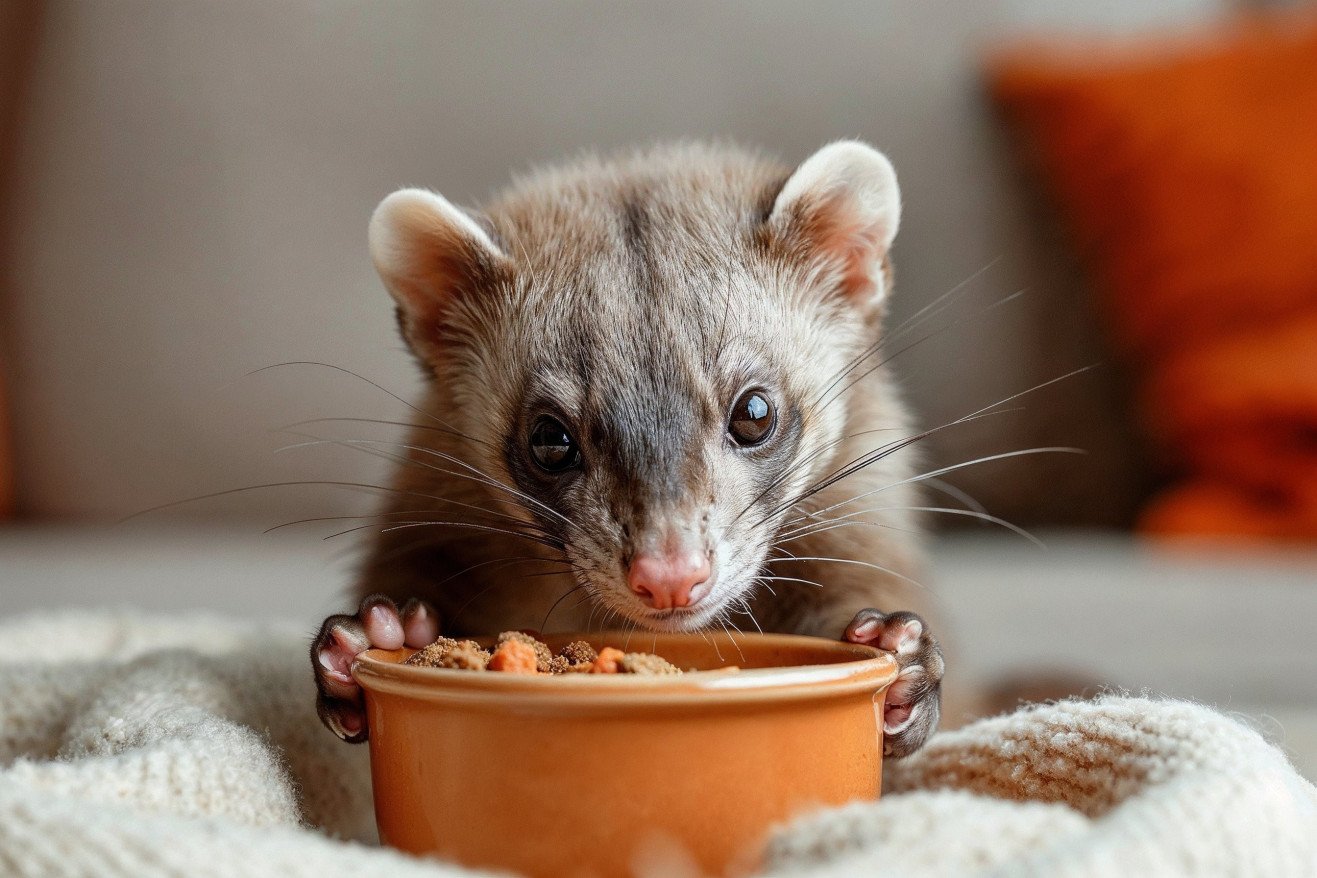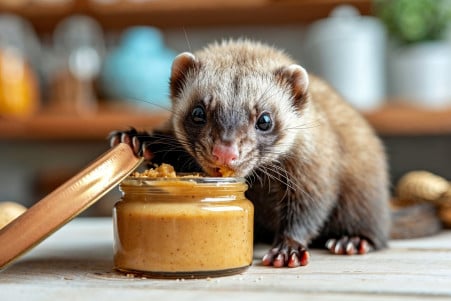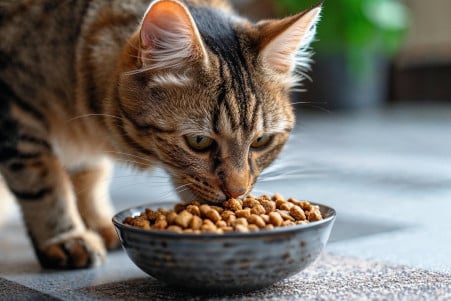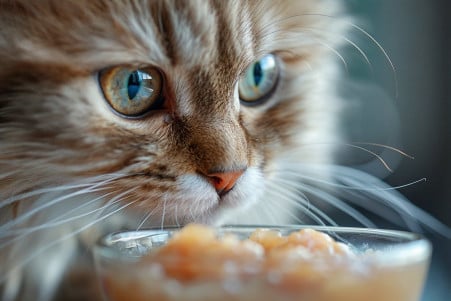Can Ferrets Eat Cat Food? Understanding the Risks and Alternatives
20 January 2024 • Updated 28 January 2024

Ferrets have specific nutritional requirements, but do those align with what’s in cat food? While ferrets can eat high-quality cat food in a pinch, it’s not the best option for their diet. Cat food has lower protein and fat and higher fiber than ferrets need. If you feed your ferret cat food long-term, they could become malnourished. Always talk to a vet about the best diet for your ferret.
We will delve into the details of ferret nutrition by looking at veterinary recommendations and research that compares the exact nutritional needs of ferrets and cats. This will help us identify the main differences and potential problems with cat food as a staple in a ferret’s diet.
Our goal is to help you understand why cat food should only be used as a temporary fix and what a well-rounded diet looks like to ensure your ferret is healthy and happy.
Can ferrets eat cat food?
Decoding the Diet: Ferret Nutritional Needs vs. Cat Food Composition
Ferrets are obligate carnivores with a short gastrointestinal transit time, which means they need a diet that is high in protein and fat and low in fiber. According to Veterinary Partner – VIN, a healthy ferret diet should consist of 30–35% protein and 15–30% fat, with low fiber content.
Cat food, on the other hand, is formulated with different macronutrient ratios; for example, PetMD notes that adult maintenance cat food must contain at least 26% protein and 9% fat. This can be problematic for ferrets, who have a low capacity to digest carbohydrates, as a study published in PMC explains.
The potential pitfalls of feeding ferrets cat food include low protein content and high carbohydrate content, both of which can lead to obesity and gastrointestinal issues. In addition, grain-based diets, which are common in cat food, have been associated with urolithiasis in ferrets.
High fiber content can also be problematic because ferrets have a short digestive system that isn’t well-suited to a high-fiber diet. These nutritional deficiencies can lead to malnutrition and other health issues in the long term, which underscores the importance of feeding ferrets a species-appropriate diet.
Risks of Feeding Your Ferret Cat Food
Feeding your ferret cat food can lead to a number of health problems. Since ferrets are obligate carnivores, they have very specific nutritional needs. If they are fed a diet high in carbohydrates and fiber, which is common in cat food, they can develop insulinoma, a pancreatic tumor that causes hypoglycemia.
In fact, according to “The Impact of Nutrition on Ferret Health,” by AndreaT, foods that are high in sugar can make the problem even worse. In addition, obesity is a concern. Since domesticated ferrets are often kept in cages, they don’t get as much exercise as they would in the wild.
Cat food doesn’t have the right balance of high protein, moderate fat, and low carbohydrates that ferrets need, which can lead to a number of weight-related issues, including heart disease and strokes.
In addition, the soft texture of canned cat food can lead to dental problems, including periodontal disease in ferrets over three years old, according to information from FERRETPAL. Furthermore, the high phosphorus content in canned cat food can cause kidney stones or kidney disease, both of which can be fatal. In fact, kidney disease is one of the top causes of death in ferrets, accounting for 10% to 15% of all ferret deaths.
The negative effects of an improper diet can add up, making it especially important to make sure that you are feeding your ferret a diet that is specifically formulated to meet their nutritional needs. This is essential to prevent these health problems and to make sure that your ferret lives a long, healthy life.
Tailored Nutrition: Why You Should Feed Your Ferret Commercial Food
Commercial ferret foods are made to meet the nutritional needs of ferrets, providing a balance of high-quality animal protein and fat with little to no carbohydrates.
As Pet Food Reviews (Australia) explains, these ferret diets are often made with meat as the first and most important ingredient and avoid the plant proteins and grains that are often found in cat food and can be harmful to ferrets.
Wysong, a company that makes genetically appropriate ferret diets, offers products like Ferret Archetype™ and Ferret Epigen 90™ that are raw meat-based and free of starch. This meets the needs of an obligate carnivore by avoiding the carbohydrate glut diseases that can occur in ferrets that are fed inappropriate diets.
The existence of ferret-specific foods like Premium Ferret Diet and Vetafarm Origins Ferret Food, as well as high-quality cat food brands like Ziwi Peak and Feline Natural that can be used in a pinch, shows that it’s easy to feed ferrets diets that are tailored to their unique nutritional needs.
These commercial options not only meet ferrets’ requirements for essential fatty acids and taurine, but they also take into account ferrets’ low thirst drive by providing them with moisture-rich foods. By choosing these tailored foods, ferret owners can make sure their pets stay healthy.
How to Feed Ferrets: More Than Just Cat Food
Although cat food is often the go-to for pet owners, it doesn’t provide all the nutrients that ferrets need. According to The Spruce Pets, ferrets are obligate carnivores, which means their diets should be high in animal-based protein and fat and low in carbohydrates and fiber. This is the opposite of cat food, which can be high in carbohydrates and plant-based proteins that are not good for ferrets.
PetMD says that it’s important to make sure that ferrets are eating a diet that’s formulated for them to ensure that they’re getting the right amount of meat-based protein without the fillers that are often found in cat food.
If you can’t find ferret food, you can feed them high-quality kitten food, but it should be high in protein and free of grains. That said, it’s important to make sure that you’re feeding your ferret a variety of foods to avoid food aversion. This can include mixing different brands of the same type of kibble.
While treats are part of a ferret’s diet, they should be given in moderation. The RSPCA suggests human-grade raw meaty bones to help with dental health and provide nutrition. You can also give them small pieces of cooked lean meat as an occasional treat to supplement their regular diet.
The most important thing is to avoid treats that are high in sugar or carbohydrates, which can lead to health problems. By making sure that you’re feeding your ferret the right regular diet and treats, you can make sure that they live a balanced and healthy life.
Conclusion
In this article, we’ve taken a deep dive into the nutritional needs of ferrets, and why it’s so important to make sure they’re eating a diet that’s formulated specifically for them. As obligate carnivores, ferrets need a diet that’s high in protein and fat and low in carbs, but the nutritional content of cat food doesn’t always fit the bill.
Regularly feeding ferrets cat food can lead to problems like obesity, insulinoma, and dental disease, all of which can have serious health implications.
Commercial ferret foods are formulated to provide a well-balanced diet that will help ferrets thrive. They contain the right levels of animal-based protein and fat that are essential to a ferret’s diet. On the other hand, cat food can lead to nutritional imbalances and other issues in the long run because it doesn’t contain these specific formulations.
As we’ve mentioned, the best thing for ferret owners to do is to work with a vet to get personalized dietary recommendations. This will help ensure that your ferret’s nutritional needs are being met and that they’re being set up for a healthy life. After all, it all starts with what’s in your ferret’s food bowl.


